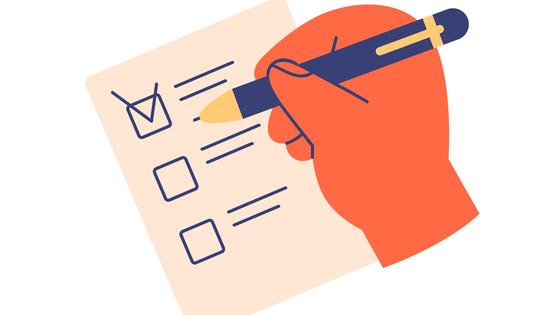Day 3. Exercises to find your path
Would you like to gain a better understanding of what you really enjoy doing? Try the following exercises below. We guarantee that they will quickly help you discover the way to your true self.

"My masterpiece" Exercise
Imagine that you are on an island which you thought was uninhabited. Unfortunately, it turns out that a very hostile tribe lives there, and they have taken you as their prisoner. However, if you give the leader of the tribe a masterpiece created with your own hands or your mind, they will set you free.
Think about what this masterpiece would be like. It could have any features, and it does not have to be an amazing drawing or a soul-stirring song. The most important thing is that you have created it. What was the first thing you thought of? What do you do best? Can you author an article or manage a tribe so they can build the Taj Mahal in three days?
"Fear" Exercise
Think about something you want to create or a dream you have long wanted to become a reality. Thinking about it should make you feel scared to the point where your heart sinks into your boots. Although your dream should be big and ambitious, it may scare you and seem far from reality. For example, you may dream of making your own film as a director or producer or starting your own business. Write down 3-5 initial fears that come to mind, and consider what will happen if those fears strike you. What happens if you achieve this dream? And what happens if you do not? You will most likely feel a surge of strength and joy when you think about what you want to do.
"Ask them" Exercise
In this exercise, you need to send some questions to your friends, relatives, and colleagues and ask them to answer them as thoroughly as possible. Choose the people you will send these questions to carefully: you should feel entirely comfortable doing this.
The list of questions:
-
What do other individuals most frequently ask me? What advice am I frequently asked?
-
Do I have knowledge that other people would like to learn? What is this knowledge?
-
What difficulties in my life have I successfully overcome?
-
Have I succeeded at anything where others have failed?
-
How can I be helpful to other people?
-
What services would you be willing to pay me for?
-
What would you lose if I were not in your life?

"Me and my family" Exercise
Ask your parents what vocations and talents your grandparents and great-grandparents had. Then, try them out for yourself. If you want to have the same skills, why not? What kind of life would you like to live?
Another exercise variation is to imagine that you are 90 years old and telling your grandchildren about your life. What would you talk about? What did you achieve, what did you love, and what do you remember in particular? What did you worry about, and what did you forget very quickly?
"Observer" Exercise
You must observe yourself for a day and write down your observations in a notebook or notes on your smartphone. Write down your thoughts. What do you regret? What are you focusing on? What are you daydreaming about? What makes your heart skip a beat, and when does it become uncomfortable for you? How do you feel when you immerse yourself in memories for a few moments?
A day after you have made your observations, reread what you have written down. Imagine that you are an outside observer. Evaluate your thoughts: what did you like, what did you write about enthusiastically, what did you often remember, what brought you joy, and what made you sad?
"Strengths" Exercise
You will need a sheet of paper (preferably a flipchart) and about an hour of free time. The sheet should be divided into four columns. The first is where you can put your knowledge and skills. You need to write down everything that you know and can do without having a level of proficiency in any skill. For example, you are great at driving a moped, you know how to manage teams, you cook an amazing quiche, etc. The second column is where you should put your favourite activities and hobbies, and what you do in your spare time or what you want to do. Here you can write down childhood dreams which never came true. The third column represents what people require from you, how you can be helpful to them, and how you can improve people's lives. The fourth is your resources - information, money, time, your internal state - whatever.
Now you have to analyse the lists. Choose the most interesting activity from the first column. Match it with what you want to do in the second column. From the third column, select people's needs that this action will accomplish, and from the fourth - a resource that will help you make it a reality. Create 3-5 links in the same manner. Select the one that appeals to you the most and start moving towards making the dream a reality.
Imagine your routine to achieve your goal. Are you confident you can accomplish it every day? Would you stray from it halfway? What will the daily process of making this dream come true look like? Won't your resources run dry?
You are going to be interested in
"Goal Setting: How to Set Goals and Achieve Them Effectively"
The principles of goal setting
Ways to achieve your goals
Self-motivation
Overcoming procrastination
0:54 hrs of video
"Reinvent Yourself: How to Learn to Enjoy Life"
Identifying your true desires
Organising your personal time
Rejecting uncertainty
Prioritising
Discovering negative attitudes
Maintaining resourcefulness
Dealing with fatigue
0:54 hrs of video
15 materials
6 tests
6 cases
"Say No to Your Fears. New Life and New Results"
Letting go of the fear of change
Stress management techniques
Working with positive thinking
Protecting your personal boundaries
Gaining self-confidence
Meditations
1:47 hrs of video
23 materials
7 tests
7 cases
Share this with your friends via:
Latest News

A significant stage in the development of the alternative education system has begun in West Northamptonshire in the UK: the County Council is actively calling on parents, guardians, and trustees to participate in shaping the future of this key area.

Outwoods Primary School in Atherstone, Warwickshire, having experienced deep sadness after the loss of their famous cat, Silla, has found solace in a new pet – a Maine Coon named Aloysius O’Hara.

In modern universities, artificial intelligence, and in particular ChatGPT, is rapidly transforming from a controversial tool into a full-fledged student assistant.

An innovative educational project is gaining momentum in UK primary schools, aiming to change attitudes towards video games.

The Massachusetts Institute of Technology (MIT) presents MIT Learn – a revolutionary online platform that opens a “new front door” to access university knowledge and resources.












 Test: How Psychologically Mature Are You? Check Your Inner Foundation.
Test: How Psychologically Mature Are You? Check Your Inner Foundation.
 Test. Check Your Social Media Dependency Level!
Test. Check Your Social Media Dependency Level!
 Test: What Business is Right For You?
Test: What Business is Right For You?
 Test: How Prone Are You to Abusive Behavior as a Manager?
Test: How Prone Are You to Abusive Behavior as a Manager?
 Test. What superpower would you possess if you were a superhero?
Test. What superpower would you possess if you were a superhero?
 Test. What Should You Let Go of Before Winter Ends?
Test. What Should You Let Go of Before Winter Ends?
